Ethical Theories and Voluntary Euthanasia: A Comprehensive Analysis
VerifiedAdded on 2020/07/22
|11
|3740
|71
Essay
AI Summary
This essay delves into the complex ethical considerations surrounding voluntary euthanasia, examining the practice of ending a life painlessly. The introduction establishes the core debate, differentiating between active, passive, voluntary, involuntary, and indirect euthanasia, as well as assisted suicide. The essay then analyzes three key ethical theories: eternal law, classical deontological ethics (universalism), and distributive justice. Eternal law is presented as a framework based on God's laws, while deontology emphasizes duty and rules, and distributive justice focuses on fairness and equitable distribution. The essay provides a critical examination of each theory's application to the issue of voluntary euthanasia, offering a nuanced understanding of the ethical dilemmas involved. The conclusion synthesizes the arguments, providing a comprehensive perspective on the ethical implications of voluntary euthanasia, supported by references to relevant literature. This assignment is available on Desklib, a platform providing study tools for students.
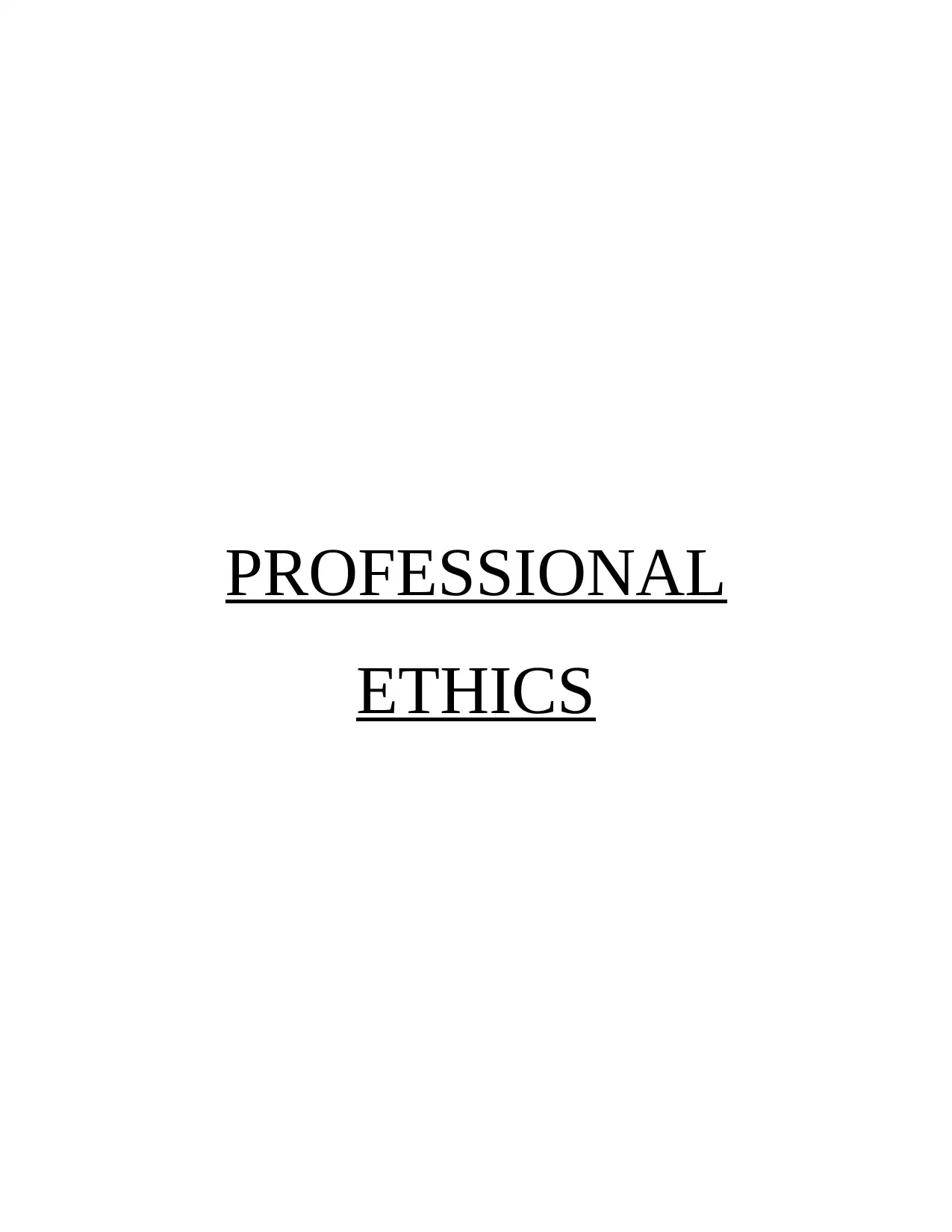
PROFESSIONAL
ETHICS
ETHICS
Paraphrase This Document
Need a fresh take? Get an instant paraphrase of this document with our AI Paraphraser
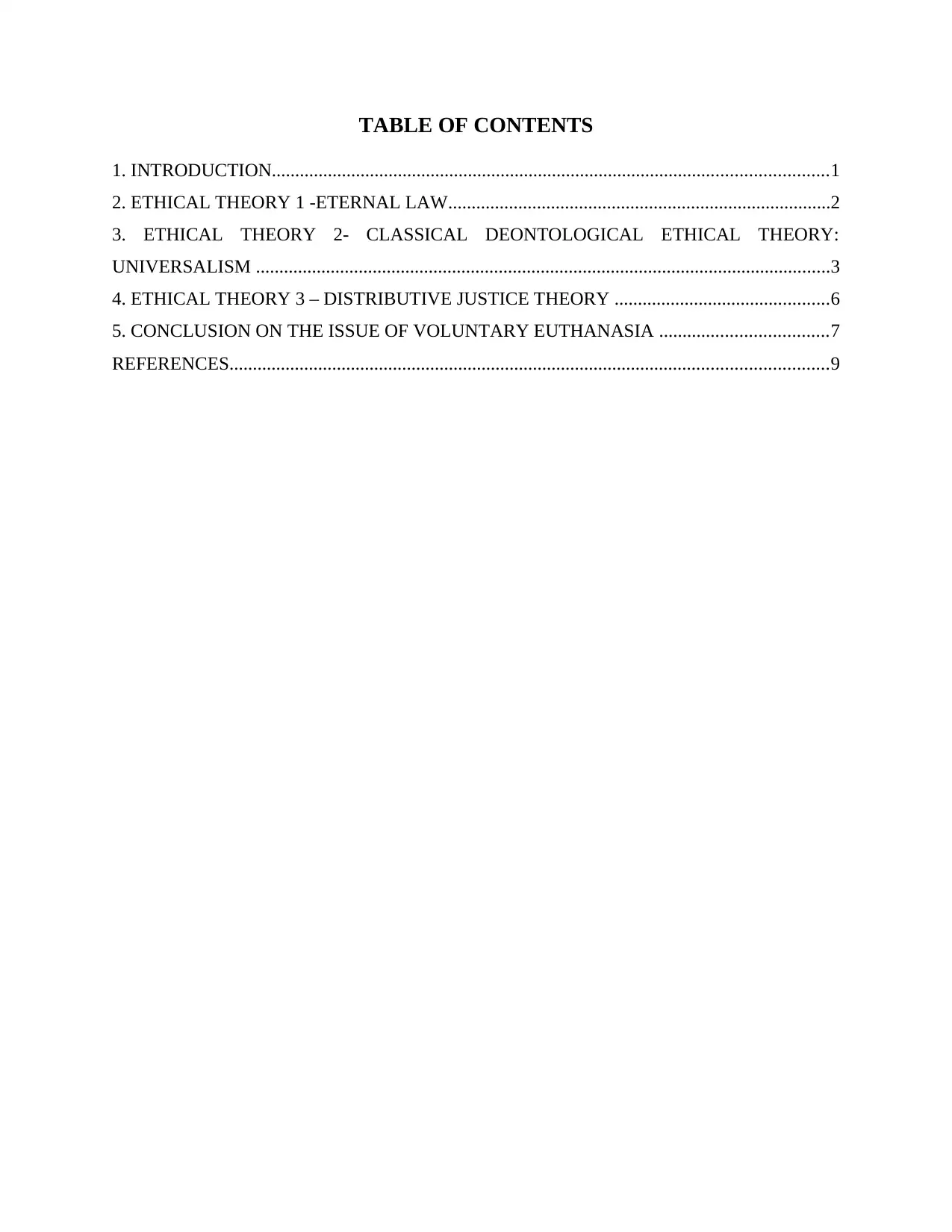
TABLE OF CONTENTS
1. INTRODUCTION.......................................................................................................................1
2. ETHICAL THEORY 1 -ETERNAL LAW..................................................................................2
3. ETHICAL THEORY 2- CLASSICAL DEONTOLOGICAL ETHICAL THEORY:
UNIVERSALISM ...........................................................................................................................3
4. ETHICAL THEORY 3 – DISTRIBUTIVE JUSTICE THEORY ..............................................6
5. CONCLUSION ON THE ISSUE OF VOLUNTARY EUTHANASIA ....................................7
REFERENCES................................................................................................................................9
1. INTRODUCTION.......................................................................................................................1
2. ETHICAL THEORY 1 -ETERNAL LAW..................................................................................2
3. ETHICAL THEORY 2- CLASSICAL DEONTOLOGICAL ETHICAL THEORY:
UNIVERSALISM ...........................................................................................................................3
4. ETHICAL THEORY 3 – DISTRIBUTIVE JUSTICE THEORY ..............................................6
5. CONCLUSION ON THE ISSUE OF VOLUNTARY EUTHANASIA ....................................7
REFERENCES................................................................................................................................9
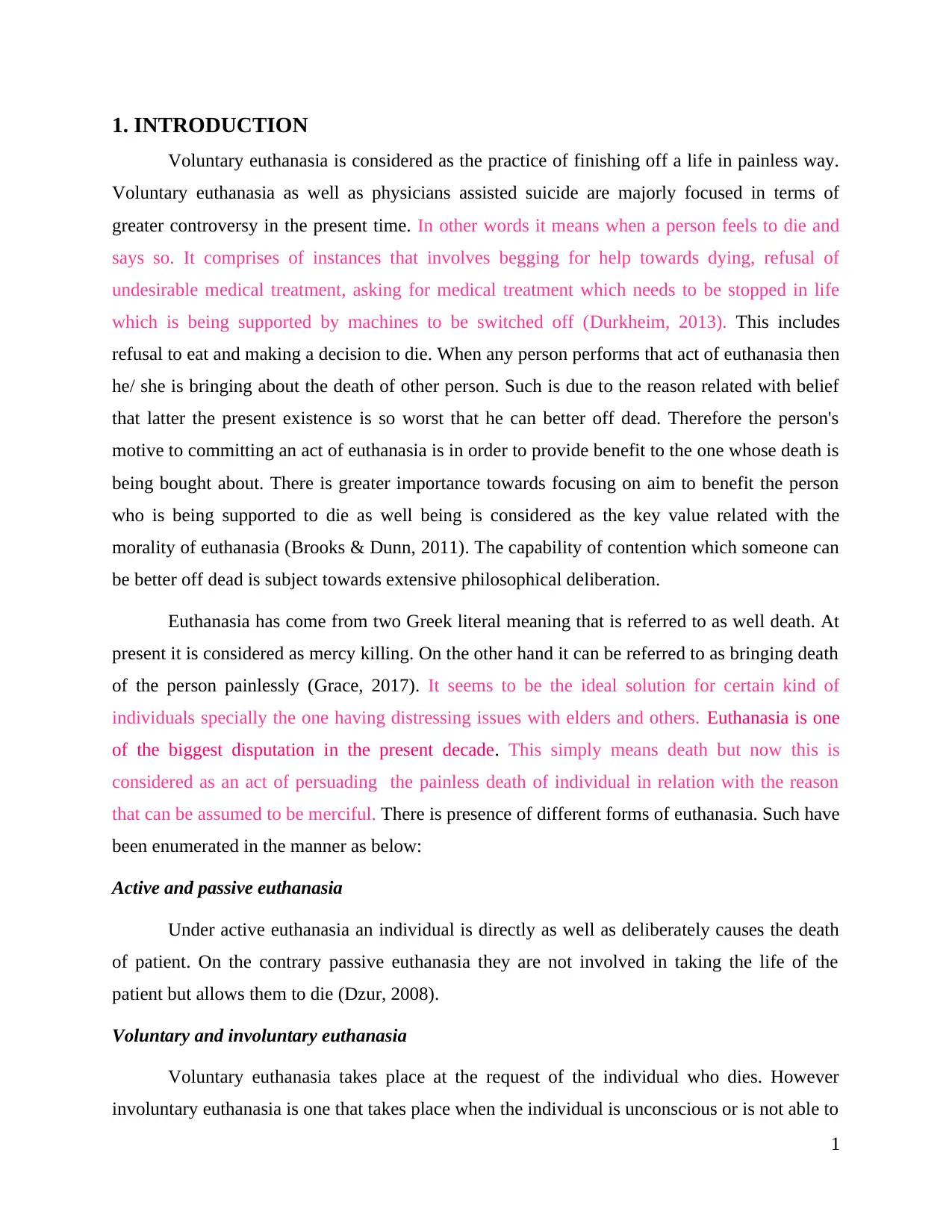
1. INTRODUCTION
Voluntary euthanasia is considered as the practice of finishing off a life in painless way.
Voluntary euthanasia as well as physicians assisted suicide are majorly focused in terms of
greater controversy in the present time. In other words it means when a person feels to die and
says so. It comprises of instances that involves begging for help towards dying, refusal of
undesirable medical treatment, asking for medical treatment which needs to be stopped in life
which is being supported by machines to be switched off (Durkheim, 2013). This includes
refusal to eat and making a decision to die. When any person performs that act of euthanasia then
he/ she is bringing about the death of other person. Such is due to the reason related with belief
that latter the present existence is so worst that he can better off dead. Therefore the person's
motive to committing an act of euthanasia is in order to provide benefit to the one whose death is
being bought about. There is greater importance towards focusing on aim to benefit the person
who is being supported to die as well being is considered as the key value related with the
morality of euthanasia (Brooks & Dunn, 2011). The capability of contention which someone can
be better off dead is subject towards extensive philosophical deliberation.
Euthanasia has come from two Greek literal meaning that is referred to as well death. At
present it is considered as mercy killing. On the other hand it can be referred to as bringing death
of the person painlessly (Grace, 2017). It seems to be the ideal solution for certain kind of
individuals specially the one having distressing issues with elders and others. Euthanasia is one
of the biggest disputation in the present decade. This simply means death but now this is
considered as an act of persuading the painless death of individual in relation with the reason
that can be assumed to be merciful. There is presence of different forms of euthanasia. Such have
been enumerated in the manner as below:
Active and passive euthanasia
Under active euthanasia an individual is directly as well as deliberately causes the death
of patient. On the contrary passive euthanasia they are not involved in taking the life of the
patient but allows them to die (Dzur, 2008).
Voluntary and involuntary euthanasia
Voluntary euthanasia takes place at the request of the individual who dies. However
involuntary euthanasia is one that takes place when the individual is unconscious or is not able to
1
Voluntary euthanasia is considered as the practice of finishing off a life in painless way.
Voluntary euthanasia as well as physicians assisted suicide are majorly focused in terms of
greater controversy in the present time. In other words it means when a person feels to die and
says so. It comprises of instances that involves begging for help towards dying, refusal of
undesirable medical treatment, asking for medical treatment which needs to be stopped in life
which is being supported by machines to be switched off (Durkheim, 2013). This includes
refusal to eat and making a decision to die. When any person performs that act of euthanasia then
he/ she is bringing about the death of other person. Such is due to the reason related with belief
that latter the present existence is so worst that he can better off dead. Therefore the person's
motive to committing an act of euthanasia is in order to provide benefit to the one whose death is
being bought about. There is greater importance towards focusing on aim to benefit the person
who is being supported to die as well being is considered as the key value related with the
morality of euthanasia (Brooks & Dunn, 2011). The capability of contention which someone can
be better off dead is subject towards extensive philosophical deliberation.
Euthanasia has come from two Greek literal meaning that is referred to as well death. At
present it is considered as mercy killing. On the other hand it can be referred to as bringing death
of the person painlessly (Grace, 2017). It seems to be the ideal solution for certain kind of
individuals specially the one having distressing issues with elders and others. Euthanasia is one
of the biggest disputation in the present decade. This simply means death but now this is
considered as an act of persuading the painless death of individual in relation with the reason
that can be assumed to be merciful. There is presence of different forms of euthanasia. Such have
been enumerated in the manner as below:
Active and passive euthanasia
Under active euthanasia an individual is directly as well as deliberately causes the death
of patient. On the contrary passive euthanasia they are not involved in taking the life of the
patient but allows them to die (Dzur, 2008).
Voluntary and involuntary euthanasia
Voluntary euthanasia takes place at the request of the individual who dies. However
involuntary euthanasia is one that takes place when the individual is unconscious or is not able to
1
⊘ This is a preview!⊘
Do you want full access?
Subscribe today to unlock all pages.

Trusted by 1+ million students worldwide
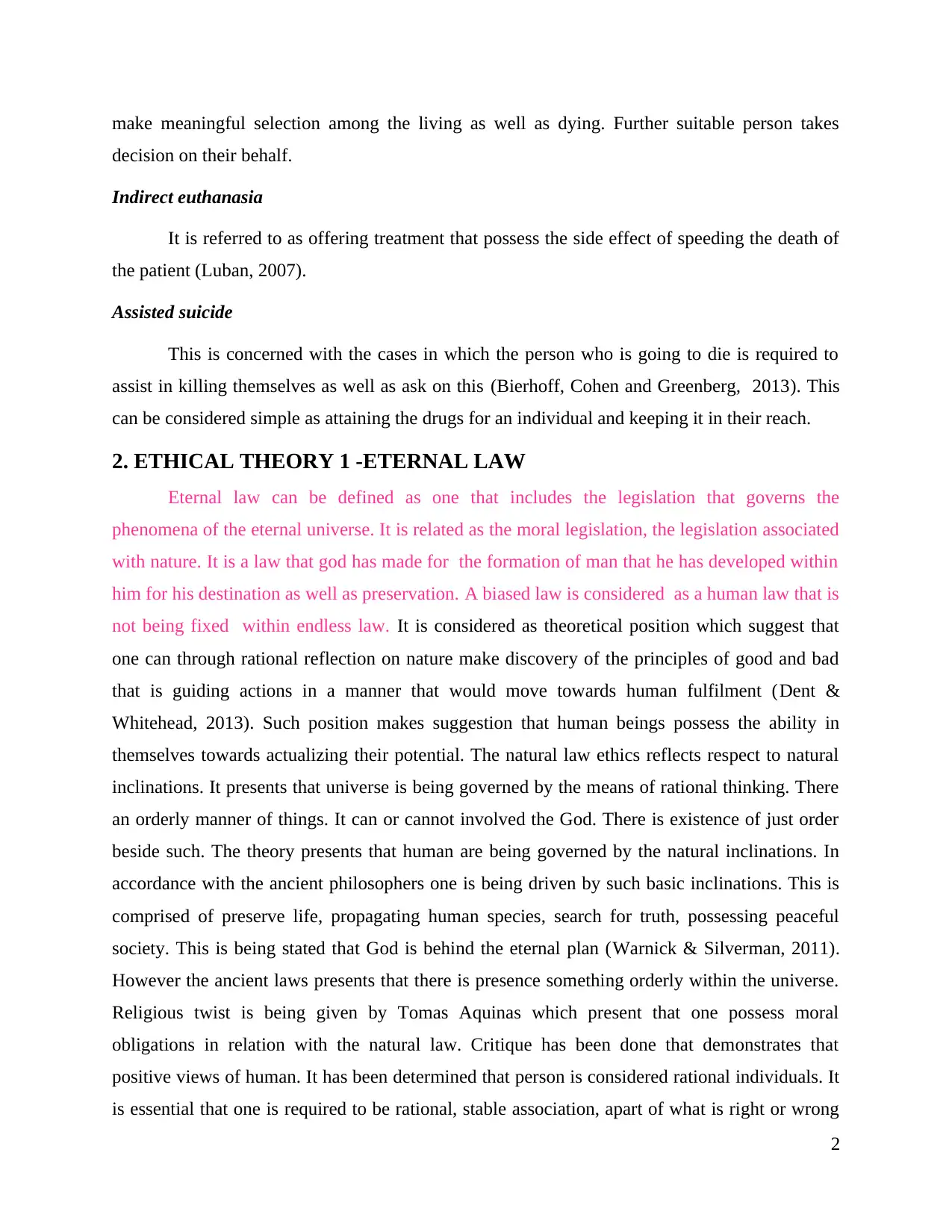
make meaningful selection among the living as well as dying. Further suitable person takes
decision on their behalf.
Indirect euthanasia
It is referred to as offering treatment that possess the side effect of speeding the death of
the patient (Luban, 2007).
Assisted suicide
This is concerned with the cases in which the person who is going to die is required to
assist in killing themselves as well as ask on this (Bierhoff, Cohen and Greenberg, 2013). This
can be considered simple as attaining the drugs for an individual and keeping it in their reach.
2. ETHICAL THEORY 1 -ETERNAL LAW
Eternal law can be defined as one that includes the legislation that governs the
phenomena of the eternal universe. It is related as the moral legislation, the legislation associated
with nature. It is a law that god has made for the formation of man that he has developed within
him for his destination as well as preservation. A biased law is considered as a human law that is
not being fixed within endless law. It is considered as theoretical position which suggest that
one can through rational reflection on nature make discovery of the principles of good and bad
that is guiding actions in a manner that would move towards human fulfilment (Dent &
Whitehead, 2013). Such position makes suggestion that human beings possess the ability in
themselves towards actualizing their potential. The natural law ethics reflects respect to natural
inclinations. It presents that universe is being governed by the means of rational thinking. There
an orderly manner of things. It can or cannot involved the God. There is existence of just order
beside such. The theory presents that human are being governed by the natural inclinations. In
accordance with the ancient philosophers one is being driven by such basic inclinations. This is
comprised of preserve life, propagating human species, search for truth, possessing peaceful
society. This is being stated that God is behind the eternal plan (Warnick & Silverman, 2011).
However the ancient laws presents that there is presence something orderly within the universe.
Religious twist is being given by Tomas Aquinas which present that one possess moral
obligations in relation with the natural law. Critique has been done that demonstrates that
positive views of human. It has been determined that person is considered rational individuals. It
is essential that one is required to be rational, stable association, apart of what is right or wrong
2
decision on their behalf.
Indirect euthanasia
It is referred to as offering treatment that possess the side effect of speeding the death of
the patient (Luban, 2007).
Assisted suicide
This is concerned with the cases in which the person who is going to die is required to
assist in killing themselves as well as ask on this (Bierhoff, Cohen and Greenberg, 2013). This
can be considered simple as attaining the drugs for an individual and keeping it in their reach.
2. ETHICAL THEORY 1 -ETERNAL LAW
Eternal law can be defined as one that includes the legislation that governs the
phenomena of the eternal universe. It is related as the moral legislation, the legislation associated
with nature. It is a law that god has made for the formation of man that he has developed within
him for his destination as well as preservation. A biased law is considered as a human law that is
not being fixed within endless law. It is considered as theoretical position which suggest that
one can through rational reflection on nature make discovery of the principles of good and bad
that is guiding actions in a manner that would move towards human fulfilment (Dent &
Whitehead, 2013). Such position makes suggestion that human beings possess the ability in
themselves towards actualizing their potential. The natural law ethics reflects respect to natural
inclinations. It presents that universe is being governed by the means of rational thinking. There
an orderly manner of things. It can or cannot involved the God. There is existence of just order
beside such. The theory presents that human are being governed by the natural inclinations. In
accordance with the ancient philosophers one is being driven by such basic inclinations. This is
comprised of preserve life, propagating human species, search for truth, possessing peaceful
society. This is being stated that God is behind the eternal plan (Warnick & Silverman, 2011).
However the ancient laws presents that there is presence something orderly within the universe.
Religious twist is being given by Tomas Aquinas which present that one possess moral
obligations in relation with the natural law. Critique has been done that demonstrates that
positive views of human. It has been determined that person is considered rational individuals. It
is essential that one is required to be rational, stable association, apart of what is right or wrong
2
Paraphrase This Document
Need a fresh take? Get an instant paraphrase of this document with our AI Paraphraser
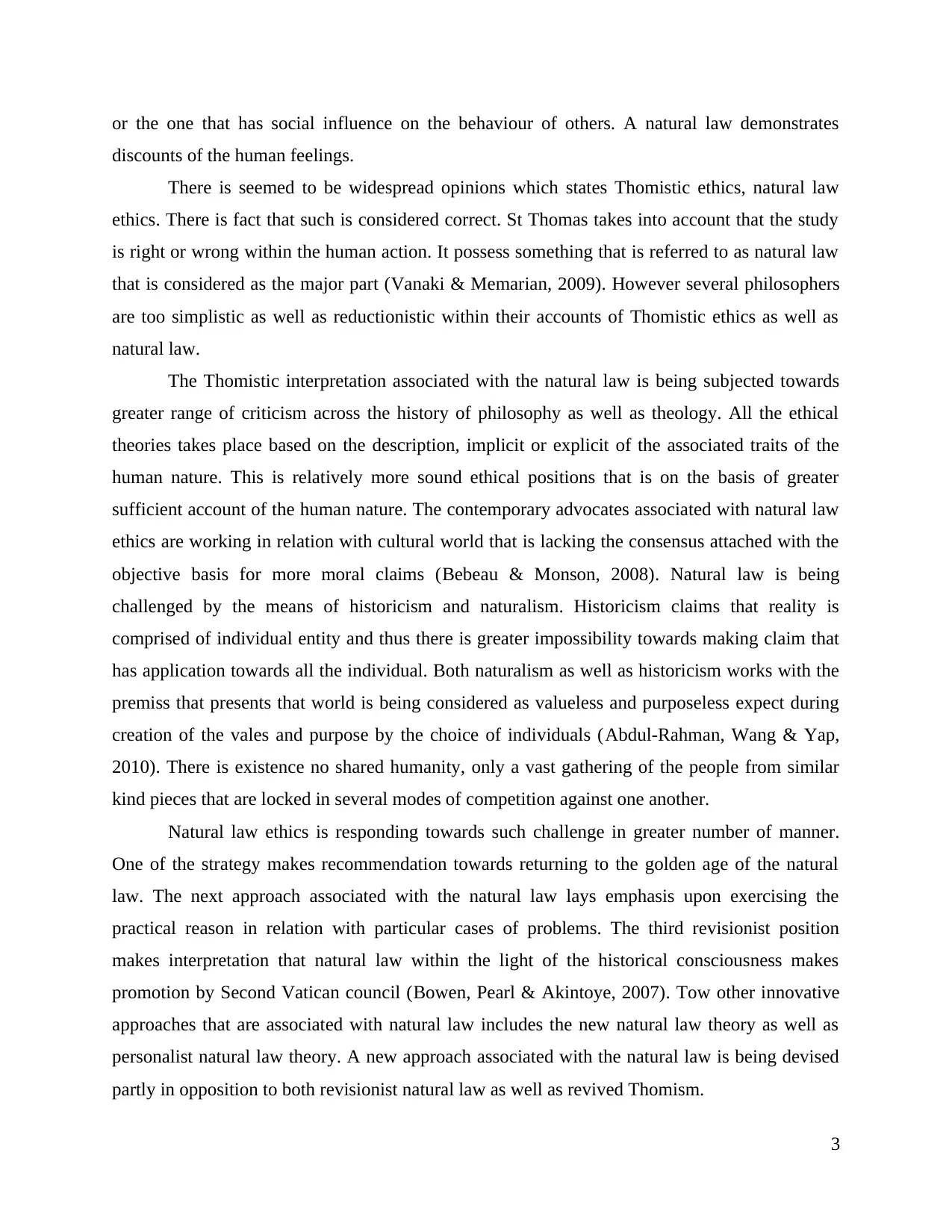
or the one that has social influence on the behaviour of others. A natural law demonstrates
discounts of the human feelings.
There is seemed to be widespread opinions which states Thomistic ethics, natural law
ethics. There is fact that such is considered correct. St Thomas takes into account that the study
is right or wrong within the human action. It possess something that is referred to as natural law
that is considered as the major part (Vanaki & Memarian, 2009). However several philosophers
are too simplistic as well as reductionistic within their accounts of Thomistic ethics as well as
natural law.
The Thomistic interpretation associated with the natural law is being subjected towards
greater range of criticism across the history of philosophy as well as theology. All the ethical
theories takes place based on the description, implicit or explicit of the associated traits of the
human nature. This is relatively more sound ethical positions that is on the basis of greater
sufficient account of the human nature. The contemporary advocates associated with natural law
ethics are working in relation with cultural world that is lacking the consensus attached with the
objective basis for more moral claims (Bebeau & Monson, 2008). Natural law is being
challenged by the means of historicism and naturalism. Historicism claims that reality is
comprised of individual entity and thus there is greater impossibility towards making claim that
has application towards all the individual. Both naturalism as well as historicism works with the
premiss that presents that world is being considered as valueless and purposeless expect during
creation of the vales and purpose by the choice of individuals (Abdul-Rahman, Wang & Yap,
2010). There is existence no shared humanity, only a vast gathering of the people from similar
kind pieces that are locked in several modes of competition against one another.
Natural law ethics is responding towards such challenge in greater number of manner.
One of the strategy makes recommendation towards returning to the golden age of the natural
law. The next approach associated with the natural law lays emphasis upon exercising the
practical reason in relation with particular cases of problems. The third revisionist position
makes interpretation that natural law within the light of the historical consciousness makes
promotion by Second Vatican council (Bowen, Pearl & Akintoye, 2007). Tow other innovative
approaches that are associated with natural law includes the new natural law theory as well as
personalist natural law theory. A new approach associated with the natural law is being devised
partly in opposition to both revisionist natural law as well as revived Thomism.
3
discounts of the human feelings.
There is seemed to be widespread opinions which states Thomistic ethics, natural law
ethics. There is fact that such is considered correct. St Thomas takes into account that the study
is right or wrong within the human action. It possess something that is referred to as natural law
that is considered as the major part (Vanaki & Memarian, 2009). However several philosophers
are too simplistic as well as reductionistic within their accounts of Thomistic ethics as well as
natural law.
The Thomistic interpretation associated with the natural law is being subjected towards
greater range of criticism across the history of philosophy as well as theology. All the ethical
theories takes place based on the description, implicit or explicit of the associated traits of the
human nature. This is relatively more sound ethical positions that is on the basis of greater
sufficient account of the human nature. The contemporary advocates associated with natural law
ethics are working in relation with cultural world that is lacking the consensus attached with the
objective basis for more moral claims (Bebeau & Monson, 2008). Natural law is being
challenged by the means of historicism and naturalism. Historicism claims that reality is
comprised of individual entity and thus there is greater impossibility towards making claim that
has application towards all the individual. Both naturalism as well as historicism works with the
premiss that presents that world is being considered as valueless and purposeless expect during
creation of the vales and purpose by the choice of individuals (Abdul-Rahman, Wang & Yap,
2010). There is existence no shared humanity, only a vast gathering of the people from similar
kind pieces that are locked in several modes of competition against one another.
Natural law ethics is responding towards such challenge in greater number of manner.
One of the strategy makes recommendation towards returning to the golden age of the natural
law. The next approach associated with the natural law lays emphasis upon exercising the
practical reason in relation with particular cases of problems. The third revisionist position
makes interpretation that natural law within the light of the historical consciousness makes
promotion by Second Vatican council (Bowen, Pearl & Akintoye, 2007). Tow other innovative
approaches that are associated with natural law includes the new natural law theory as well as
personalist natural law theory. A new approach associated with the natural law is being devised
partly in opposition to both revisionist natural law as well as revived Thomism.
3
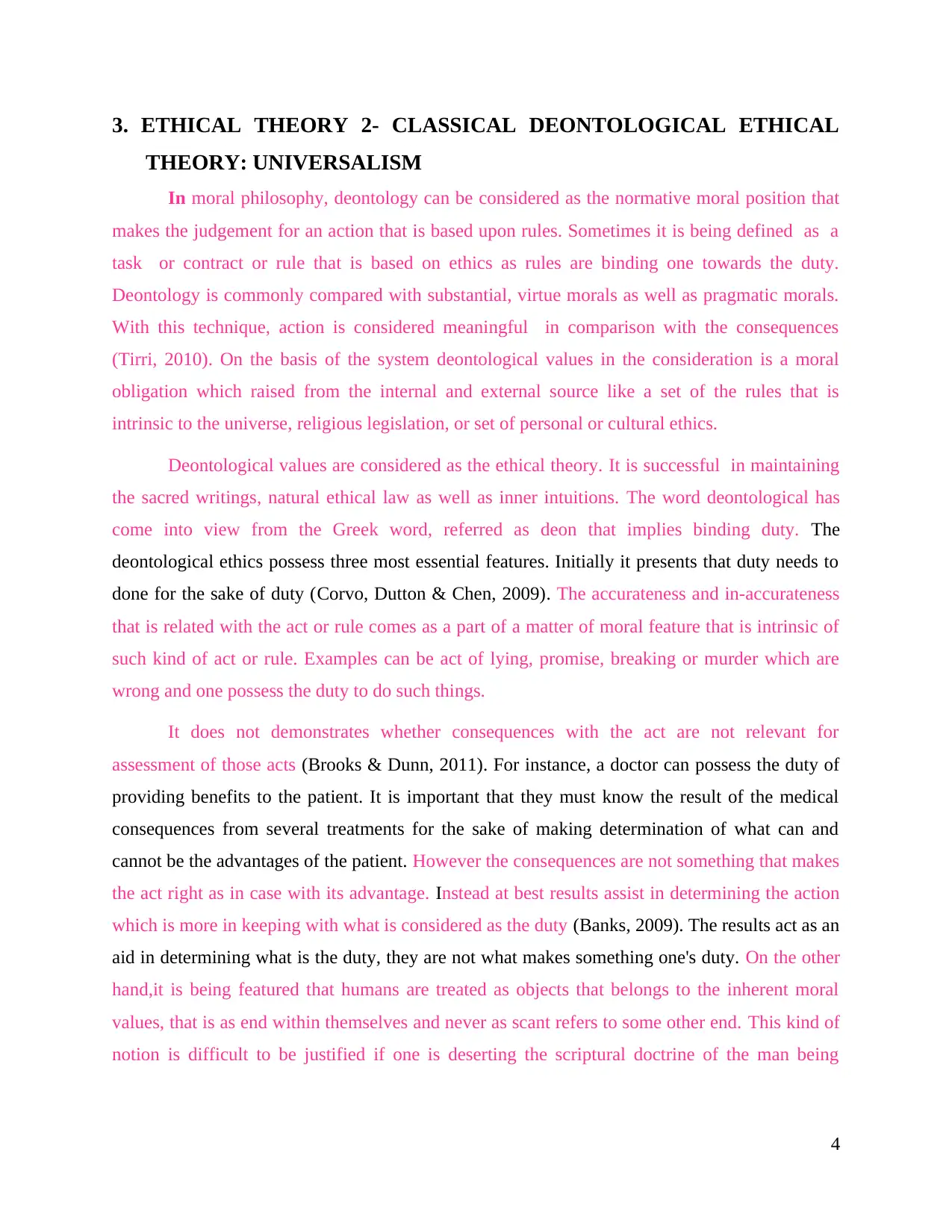
3. ETHICAL THEORY 2- CLASSICAL DEONTOLOGICAL ETHICAL
THEORY: UNIVERSALISM
In moral philosophy, deontology can be considered as the normative moral position that
makes the judgement for an action that is based upon rules. Sometimes it is being defined as a
task or contract or rule that is based on ethics as rules are binding one towards the duty.
Deontology is commonly compared with substantial, virtue morals as well as pragmatic morals.
With this technique, action is considered meaningful in comparison with the consequences
(Tirri, 2010). On the basis of the system deontological values in the consideration is a moral
obligation which raised from the internal and external source like a set of the rules that is
intrinsic to the universe, religious legislation, or set of personal or cultural ethics.
Deontological values are considered as the ethical theory. It is successful in maintaining
the sacred writings, natural ethical law as well as inner intuitions. The word deontological has
come into view from the Greek word, referred as deon that implies binding duty. The
deontological ethics possess three most essential features. Initially it presents that duty needs to
done for the sake of duty (Corvo, Dutton & Chen, 2009). The accurateness and in-accurateness
that is related with the act or rule comes as a part of a matter of moral feature that is intrinsic of
such kind of act or rule. Examples can be act of lying, promise, breaking or murder which are
wrong and one possess the duty to do such things.
It does not demonstrates whether consequences with the act are not relevant for
assessment of those acts (Brooks & Dunn, 2011). For instance, a doctor can possess the duty of
providing benefits to the patient. It is important that they must know the result of the medical
consequences from several treatments for the sake of making determination of what can and
cannot be the advantages of the patient. However the consequences are not something that makes
the act right as in case with its advantage. Instead at best results assist in determining the action
which is more in keeping with what is considered as the duty (Banks, 2009). The results act as an
aid in determining what is the duty, they are not what makes something one's duty. On the other
hand,it is being featured that humans are treated as objects that belongs to the inherent moral
values, that is as end within themselves and never as scant refers to some other end. This kind of
notion is difficult to be justified if one is deserting the scriptural doctrine of the man being
4
THEORY: UNIVERSALISM
In moral philosophy, deontology can be considered as the normative moral position that
makes the judgement for an action that is based upon rules. Sometimes it is being defined as a
task or contract or rule that is based on ethics as rules are binding one towards the duty.
Deontology is commonly compared with substantial, virtue morals as well as pragmatic morals.
With this technique, action is considered meaningful in comparison with the consequences
(Tirri, 2010). On the basis of the system deontological values in the consideration is a moral
obligation which raised from the internal and external source like a set of the rules that is
intrinsic to the universe, religious legislation, or set of personal or cultural ethics.
Deontological values are considered as the ethical theory. It is successful in maintaining
the sacred writings, natural ethical law as well as inner intuitions. The word deontological has
come into view from the Greek word, referred as deon that implies binding duty. The
deontological ethics possess three most essential features. Initially it presents that duty needs to
done for the sake of duty (Corvo, Dutton & Chen, 2009). The accurateness and in-accurateness
that is related with the act or rule comes as a part of a matter of moral feature that is intrinsic of
such kind of act or rule. Examples can be act of lying, promise, breaking or murder which are
wrong and one possess the duty to do such things.
It does not demonstrates whether consequences with the act are not relevant for
assessment of those acts (Brooks & Dunn, 2011). For instance, a doctor can possess the duty of
providing benefits to the patient. It is important that they must know the result of the medical
consequences from several treatments for the sake of making determination of what can and
cannot be the advantages of the patient. However the consequences are not something that makes
the act right as in case with its advantage. Instead at best results assist in determining the action
which is more in keeping with what is considered as the duty (Banks, 2009). The results act as an
aid in determining what is the duty, they are not what makes something one's duty. On the other
hand,it is being featured that humans are treated as objects that belongs to the inherent moral
values, that is as end within themselves and never as scant refers to some other end. This kind of
notion is difficult to be justified if one is deserting the scriptural doctrine of the man being
4
⊘ This is a preview!⊘
Do you want full access?
Subscribe today to unlock all pages.

Trusted by 1+ million students worldwide
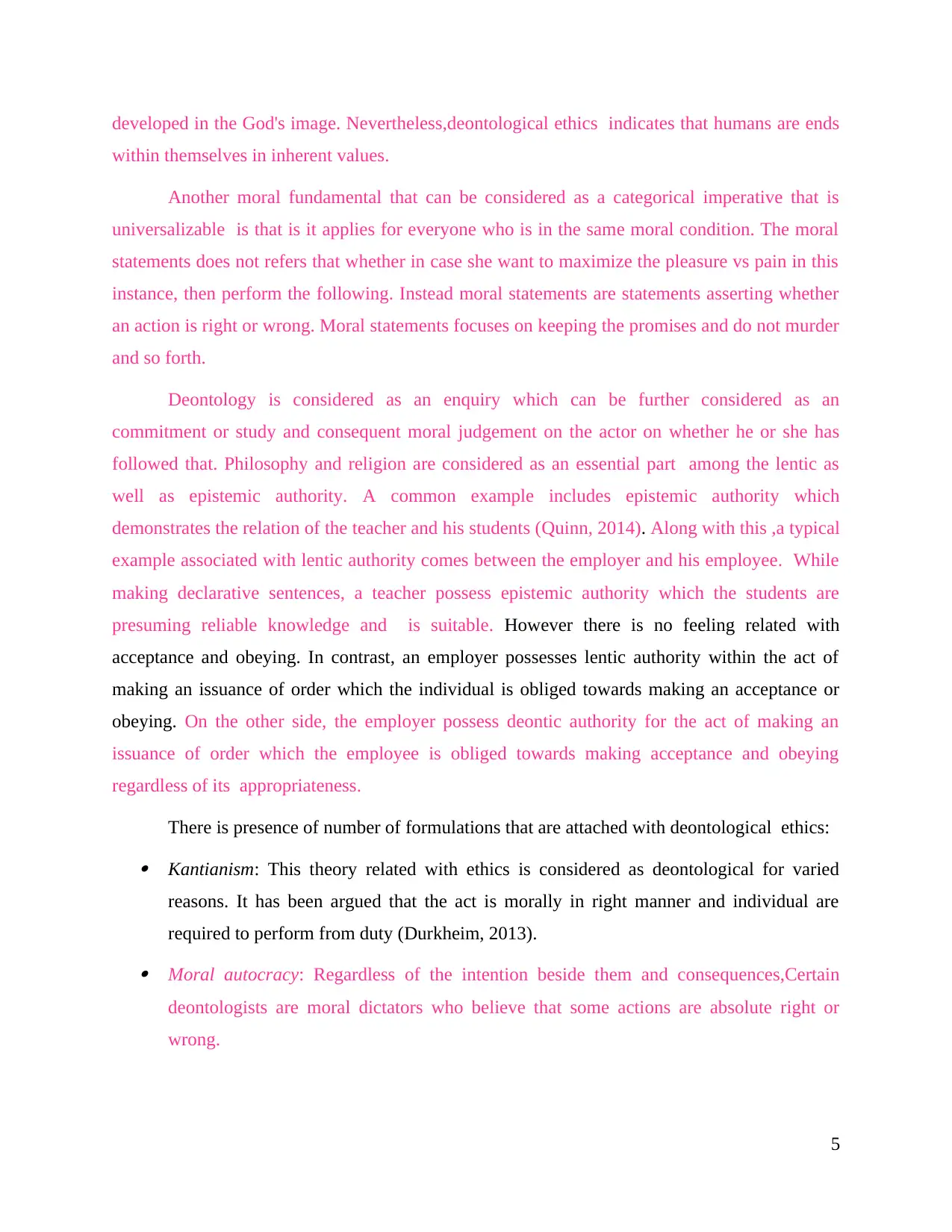
developed in the God's image. Nevertheless,deontological ethics indicates that humans are ends
within themselves in inherent values.
Another moral fundamental that can be considered as a categorical imperative that is
universalizable is that is it applies for everyone who is in the same moral condition. The moral
statements does not refers that whether in case she want to maximize the pleasure vs pain in this
instance, then perform the following. Instead moral statements are statements asserting whether
an action is right or wrong. Moral statements focuses on keeping the promises and do not murder
and so forth.
Deontology is considered as an enquiry which can be further considered as an
commitment or study and consequent moral judgement on the actor on whether he or she has
followed that. Philosophy and religion are considered as an essential part among the lentic as
well as epistemic authority. A common example includes epistemic authority which
demonstrates the relation of the teacher and his students (Quinn, 2014). Along with this ,a typical
example associated with lentic authority comes between the employer and his employee. While
making declarative sentences, a teacher possess epistemic authority which the students are
presuming reliable knowledge and is suitable. However there is no feeling related with
acceptance and obeying. In contrast, an employer possesses lentic authority within the act of
making an issuance of order which the individual is obliged towards making an acceptance or
obeying. On the other side, the employer possess deontic authority for the act of making an
issuance of order which the employee is obliged towards making acceptance and obeying
regardless of its appropriateness.
There is presence of number of formulations that are attached with deontological ethics: Kantianism: This theory related with ethics is considered as deontological for varied
reasons. It has been argued that the act is morally in right manner and individual are
required to perform from duty (Durkheim, 2013). Moral autocracy: Regardless of the intention beside them and consequences,Certain
deontologists are moral dictators who believe that some actions are absolute right or
wrong.
5
within themselves in inherent values.
Another moral fundamental that can be considered as a categorical imperative that is
universalizable is that is it applies for everyone who is in the same moral condition. The moral
statements does not refers that whether in case she want to maximize the pleasure vs pain in this
instance, then perform the following. Instead moral statements are statements asserting whether
an action is right or wrong. Moral statements focuses on keeping the promises and do not murder
and so forth.
Deontology is considered as an enquiry which can be further considered as an
commitment or study and consequent moral judgement on the actor on whether he or she has
followed that. Philosophy and religion are considered as an essential part among the lentic as
well as epistemic authority. A common example includes epistemic authority which
demonstrates the relation of the teacher and his students (Quinn, 2014). Along with this ,a typical
example associated with lentic authority comes between the employer and his employee. While
making declarative sentences, a teacher possess epistemic authority which the students are
presuming reliable knowledge and is suitable. However there is no feeling related with
acceptance and obeying. In contrast, an employer possesses lentic authority within the act of
making an issuance of order which the individual is obliged towards making an acceptance or
obeying. On the other side, the employer possess deontic authority for the act of making an
issuance of order which the employee is obliged towards making acceptance and obeying
regardless of its appropriateness.
There is presence of number of formulations that are attached with deontological ethics: Kantianism: This theory related with ethics is considered as deontological for varied
reasons. It has been argued that the act is morally in right manner and individual are
required to perform from duty (Durkheim, 2013). Moral autocracy: Regardless of the intention beside them and consequences,Certain
deontologists are moral dictators who believe that some actions are absolute right or
wrong.
5
Paraphrase This Document
Need a fresh take? Get an instant paraphrase of this document with our AI Paraphraser
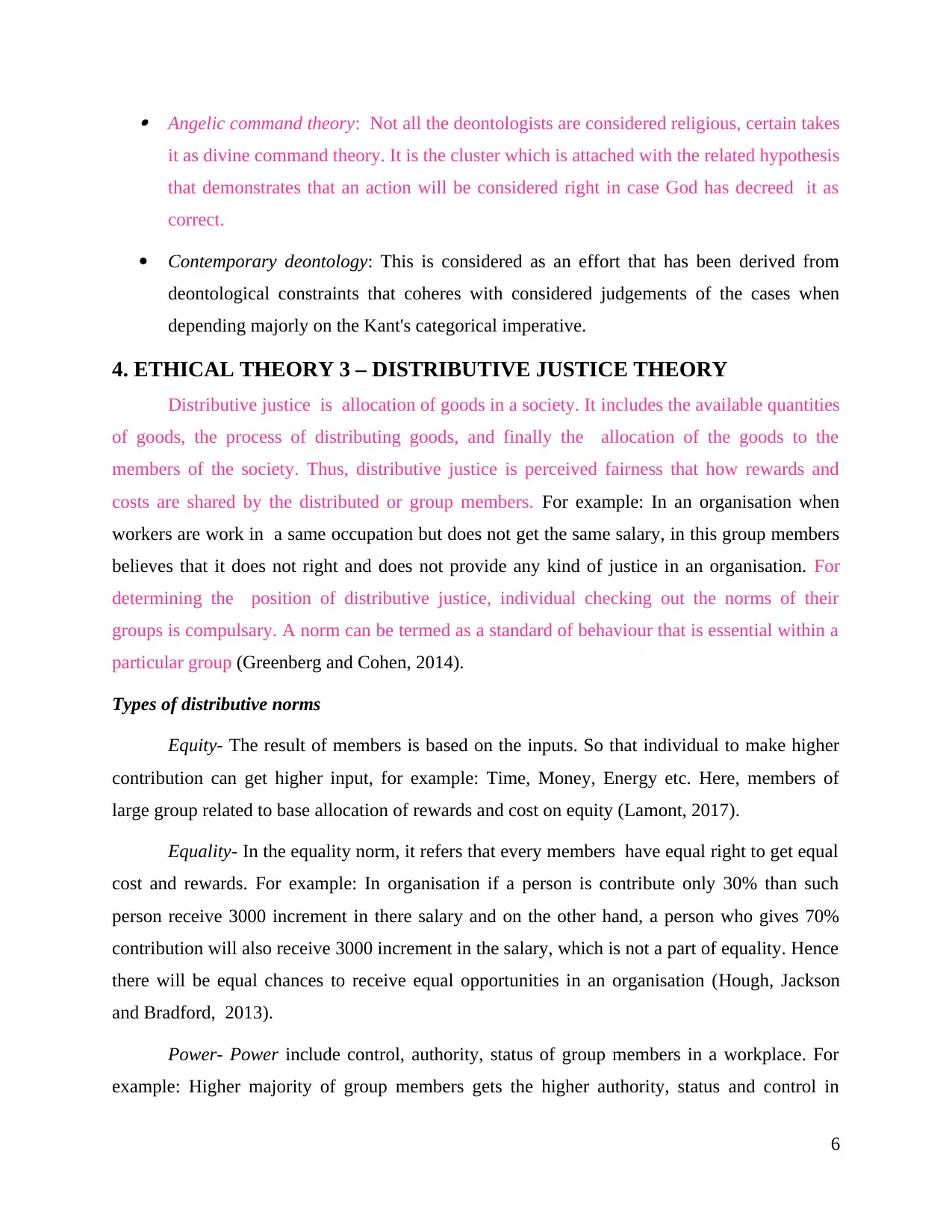
Angelic command theory: Not all the deontologists are considered religious, certain takes
it as divine command theory. It is the cluster which is attached with the related hypothesis
that demonstrates that an action will be considered right in case God has decreed it as
correct.
Contemporary deontology: This is considered as an effort that has been derived from
deontological constraints that coheres with considered judgements of the cases when
depending majorly on the Kant's categorical imperative.
4. ETHICAL THEORY 3 – DISTRIBUTIVE JUSTICE THEORY
Distributive justice is allocation of goods in a society. It includes the available quantities
of goods, the process of distributing goods, and finally the allocation of the goods to the
members of the society. Thus, distributive justice is perceived fairness that how rewards and
costs are shared by the distributed or group members. For example: In an organisation when
workers are work in a same occupation but does not get the same salary, in this group members
believes that it does not right and does not provide any kind of justice in an organisation. For
determining the position of distributive justice, individual checking out the norms of their
groups is compulsary. A norm can be termed as a standard of behaviour that is essential within a
particular group (Greenberg and Cohen, 2014).
Types of distributive norms
Equity- The result of members is based on the inputs. So that individual to make higher
contribution can get higher input, for example: Time, Money, Energy etc. Here, members of
large group related to base allocation of rewards and cost on equity (Lamont, 2017).
Equality- In the equality norm, it refers that every members have equal right to get equal
cost and rewards. For example: In organisation if a person is contribute only 30% than such
person receive 3000 increment in there salary and on the other hand, a person who gives 70%
contribution will also receive 3000 increment in the salary, which is not a part of equality. Hence
there will be equal chances to receive equal opportunities in an organisation (Hough, Jackson
and Bradford, 2013).
Power- Power include control, authority, status of group members in a workplace. For
example: Higher majority of group members gets the higher authority, status and control in
6
it as divine command theory. It is the cluster which is attached with the related hypothesis
that demonstrates that an action will be considered right in case God has decreed it as
correct.
Contemporary deontology: This is considered as an effort that has been derived from
deontological constraints that coheres with considered judgements of the cases when
depending majorly on the Kant's categorical imperative.
4. ETHICAL THEORY 3 – DISTRIBUTIVE JUSTICE THEORY
Distributive justice is allocation of goods in a society. It includes the available quantities
of goods, the process of distributing goods, and finally the allocation of the goods to the
members of the society. Thus, distributive justice is perceived fairness that how rewards and
costs are shared by the distributed or group members. For example: In an organisation when
workers are work in a same occupation but does not get the same salary, in this group members
believes that it does not right and does not provide any kind of justice in an organisation. For
determining the position of distributive justice, individual checking out the norms of their
groups is compulsary. A norm can be termed as a standard of behaviour that is essential within a
particular group (Greenberg and Cohen, 2014).
Types of distributive norms
Equity- The result of members is based on the inputs. So that individual to make higher
contribution can get higher input, for example: Time, Money, Energy etc. Here, members of
large group related to base allocation of rewards and cost on equity (Lamont, 2017).
Equality- In the equality norm, it refers that every members have equal right to get equal
cost and rewards. For example: In organisation if a person is contribute only 30% than such
person receive 3000 increment in there salary and on the other hand, a person who gives 70%
contribution will also receive 3000 increment in the salary, which is not a part of equality. Hence
there will be equal chances to receive equal opportunities in an organisation (Hough, Jackson
and Bradford, 2013).
Power- Power include control, authority, status of group members in a workplace. For
example: Higher majority of group members gets the higher authority, status and control in
6
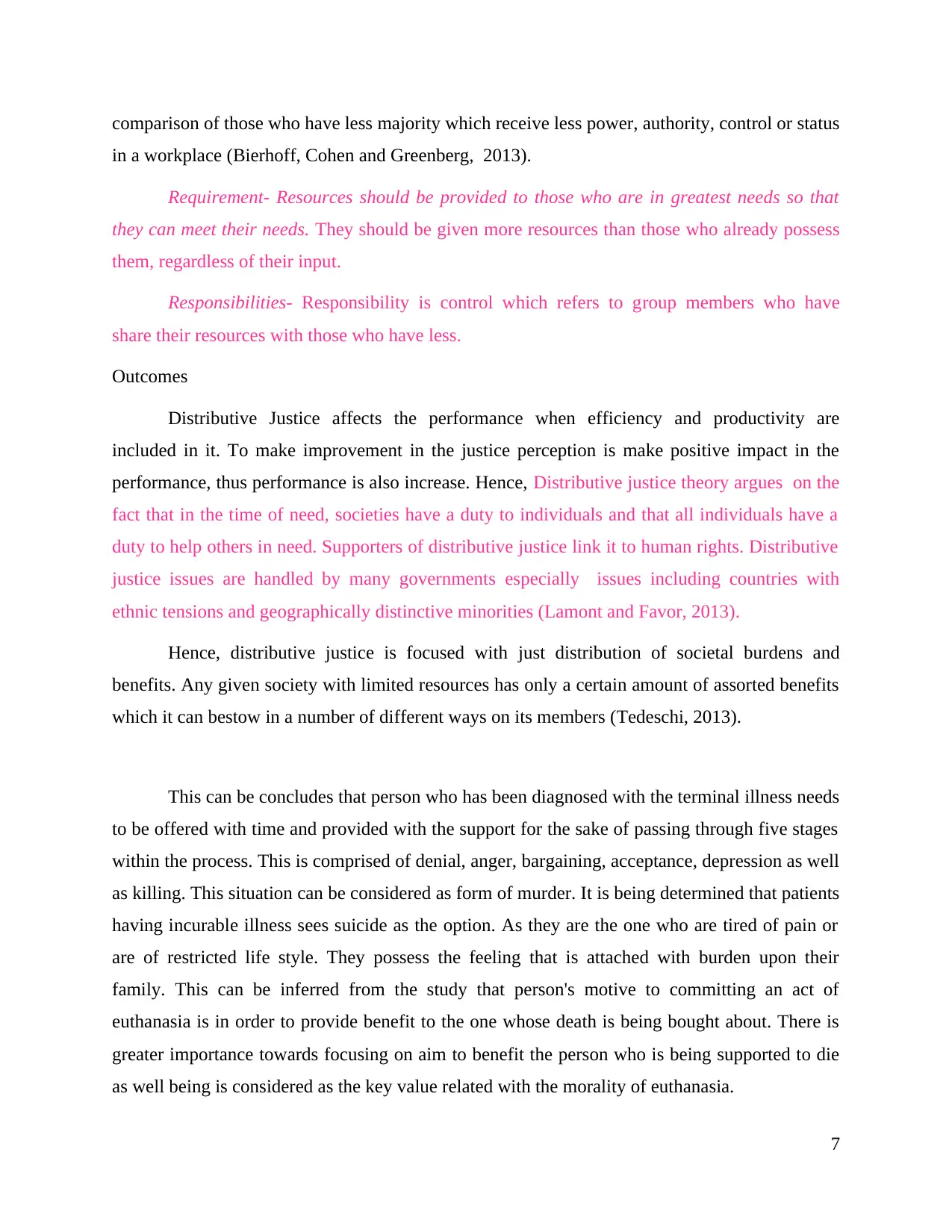
comparison of those who have less majority which receive less power, authority, control or status
in a workplace (Bierhoff, Cohen and Greenberg, 2013).
Requirement- Resources should be provided to those who are in greatest needs so that
they can meet their needs. They should be given more resources than those who already possess
them, regardless of their input.
Responsibilities- Responsibility is control which refers to group members who have
share their resources with those who have less.
Outcomes
Distributive Justice affects the performance when efficiency and productivity are
included in it. To make improvement in the justice perception is make positive impact in the
performance, thus performance is also increase. Hence, Distributive justice theory argues on the
fact that in the time of need, societies have a duty to individuals and that all individuals have a
duty to help others in need. Supporters of distributive justice link it to human rights. Distributive
justice issues are handled by many governments especially issues including countries with
ethnic tensions and geographically distinctive minorities (Lamont and Favor, 2013).
Hence, distributive justice is focused with just distribution of societal burdens and
benefits. Any given society with limited resources has only a certain amount of assorted benefits
which it can bestow in a number of different ways on its members (Tedeschi, 2013).
This can be concludes that person who has been diagnosed with the terminal illness needs
to be offered with time and provided with the support for the sake of passing through five stages
within the process. This is comprised of denial, anger, bargaining, acceptance, depression as well
as killing. This situation can be considered as form of murder. It is being determined that patients
having incurable illness sees suicide as the option. As they are the one who are tired of pain or
are of restricted life style. They possess the feeling that is attached with burden upon their
family. This can be inferred from the study that person's motive to committing an act of
euthanasia is in order to provide benefit to the one whose death is being bought about. There is
greater importance towards focusing on aim to benefit the person who is being supported to die
as well being is considered as the key value related with the morality of euthanasia.
7
in a workplace (Bierhoff, Cohen and Greenberg, 2013).
Requirement- Resources should be provided to those who are in greatest needs so that
they can meet their needs. They should be given more resources than those who already possess
them, regardless of their input.
Responsibilities- Responsibility is control which refers to group members who have
share their resources with those who have less.
Outcomes
Distributive Justice affects the performance when efficiency and productivity are
included in it. To make improvement in the justice perception is make positive impact in the
performance, thus performance is also increase. Hence, Distributive justice theory argues on the
fact that in the time of need, societies have a duty to individuals and that all individuals have a
duty to help others in need. Supporters of distributive justice link it to human rights. Distributive
justice issues are handled by many governments especially issues including countries with
ethnic tensions and geographically distinctive minorities (Lamont and Favor, 2013).
Hence, distributive justice is focused with just distribution of societal burdens and
benefits. Any given society with limited resources has only a certain amount of assorted benefits
which it can bestow in a number of different ways on its members (Tedeschi, 2013).
This can be concludes that person who has been diagnosed with the terminal illness needs
to be offered with time and provided with the support for the sake of passing through five stages
within the process. This is comprised of denial, anger, bargaining, acceptance, depression as well
as killing. This situation can be considered as form of murder. It is being determined that patients
having incurable illness sees suicide as the option. As they are the one who are tired of pain or
are of restricted life style. They possess the feeling that is attached with burden upon their
family. This can be inferred from the study that person's motive to committing an act of
euthanasia is in order to provide benefit to the one whose death is being bought about. There is
greater importance towards focusing on aim to benefit the person who is being supported to die
as well being is considered as the key value related with the morality of euthanasia.
7
⊘ This is a preview!⊘
Do you want full access?
Subscribe today to unlock all pages.

Trusted by 1+ million students worldwide
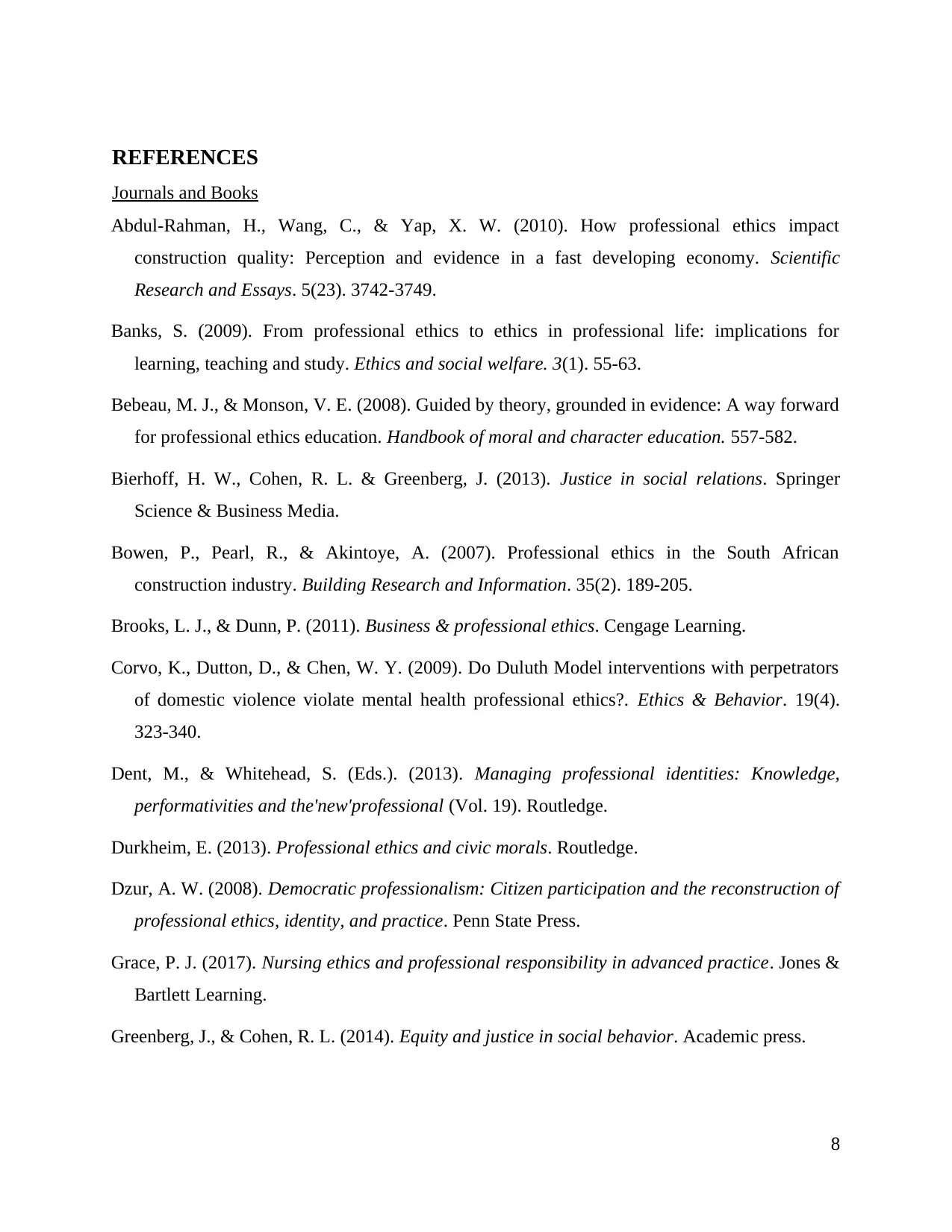
REFERENCES
Journals and Books
Abdul-Rahman, H., Wang, C., & Yap, X. W. (2010). How professional ethics impact
construction quality: Perception and evidence in a fast developing economy. Scientific
Research and Essays. 5(23). 3742-3749.
Banks, S. (2009). From professional ethics to ethics in professional life: implications for
learning, teaching and study. Ethics and social welfare. 3(1). 55-63.
Bebeau, M. J., & Monson, V. E. (2008). Guided by theory, grounded in evidence: A way forward
for professional ethics education. Handbook of moral and character education. 557-582.
Bierhoff, H. W., Cohen, R. L. & Greenberg, J. (2013). Justice in social relations. Springer
Science & Business Media.
Bowen, P., Pearl, R., & Akintoye, A. (2007). Professional ethics in the South African
construction industry. Building Research and Information. 35(2). 189-205.
Brooks, L. J., & Dunn, P. (2011). Business & professional ethics. Cengage Learning.
Corvo, K., Dutton, D., & Chen, W. Y. (2009). Do Duluth Model interventions with perpetrators
of domestic violence violate mental health professional ethics?. Ethics & Behavior. 19(4).
323-340.
Dent, M., & Whitehead, S. (Eds.). (2013). Managing professional identities: Knowledge,
performativities and the'new'professional (Vol. 19). Routledge.
Durkheim, E. (2013). Professional ethics and civic morals. Routledge.
Dzur, A. W. (2008). Democratic professionalism: Citizen participation and the reconstruction of
professional ethics, identity, and practice. Penn State Press.
Grace, P. J. (2017). Nursing ethics and professional responsibility in advanced practice. Jones &
Bartlett Learning.
Greenberg, J., & Cohen, R. L. (2014). Equity and justice in social behavior. Academic press.
8
Journals and Books
Abdul-Rahman, H., Wang, C., & Yap, X. W. (2010). How professional ethics impact
construction quality: Perception and evidence in a fast developing economy. Scientific
Research and Essays. 5(23). 3742-3749.
Banks, S. (2009). From professional ethics to ethics in professional life: implications for
learning, teaching and study. Ethics and social welfare. 3(1). 55-63.
Bebeau, M. J., & Monson, V. E. (2008). Guided by theory, grounded in evidence: A way forward
for professional ethics education. Handbook of moral and character education. 557-582.
Bierhoff, H. W., Cohen, R. L. & Greenberg, J. (2013). Justice in social relations. Springer
Science & Business Media.
Bowen, P., Pearl, R., & Akintoye, A. (2007). Professional ethics in the South African
construction industry. Building Research and Information. 35(2). 189-205.
Brooks, L. J., & Dunn, P. (2011). Business & professional ethics. Cengage Learning.
Corvo, K., Dutton, D., & Chen, W. Y. (2009). Do Duluth Model interventions with perpetrators
of domestic violence violate mental health professional ethics?. Ethics & Behavior. 19(4).
323-340.
Dent, M., & Whitehead, S. (Eds.). (2013). Managing professional identities: Knowledge,
performativities and the'new'professional (Vol. 19). Routledge.
Durkheim, E. (2013). Professional ethics and civic morals. Routledge.
Dzur, A. W. (2008). Democratic professionalism: Citizen participation and the reconstruction of
professional ethics, identity, and practice. Penn State Press.
Grace, P. J. (2017). Nursing ethics and professional responsibility in advanced practice. Jones &
Bartlett Learning.
Greenberg, J., & Cohen, R. L. (2014). Equity and justice in social behavior. Academic press.
8
Paraphrase This Document
Need a fresh take? Get an instant paraphrase of this document with our AI Paraphraser
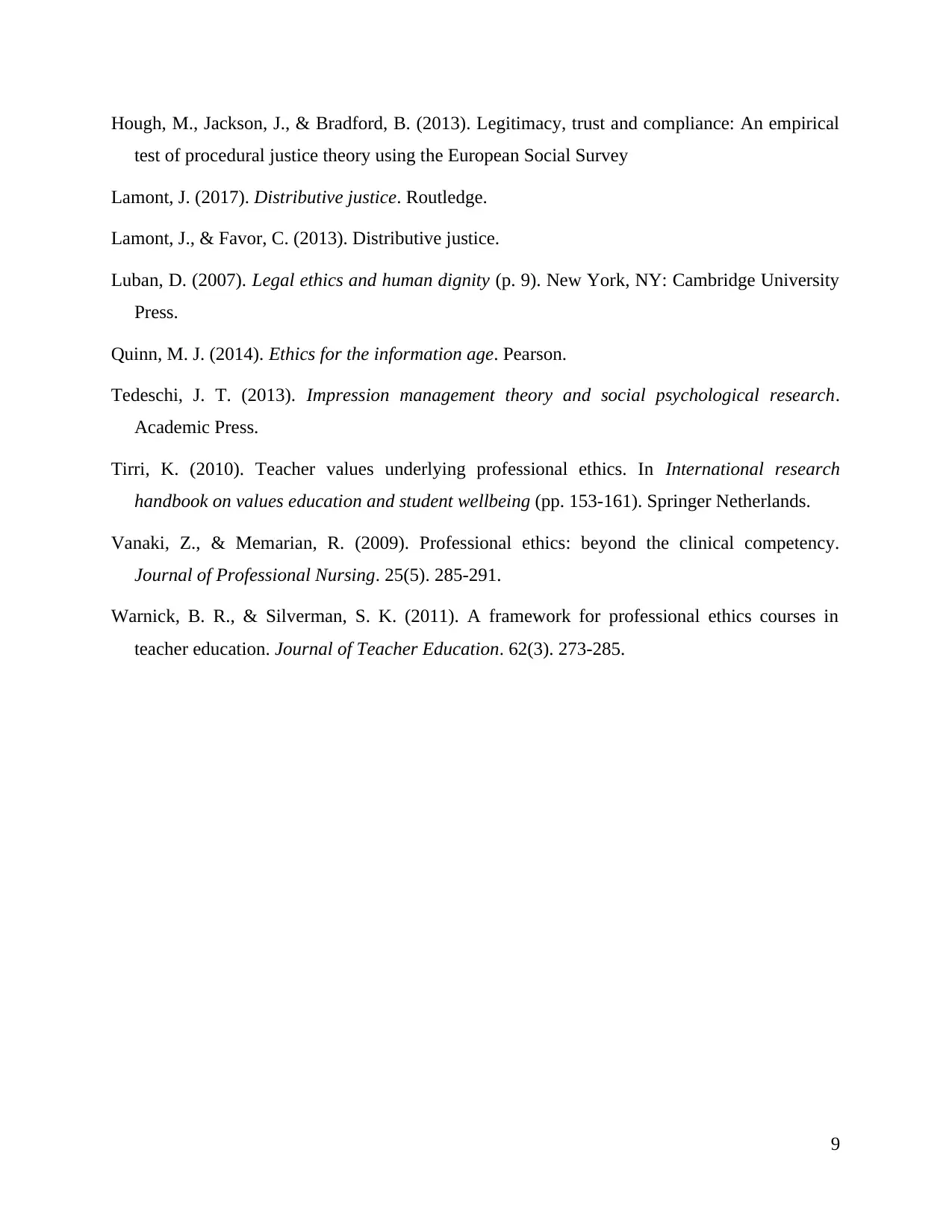
Hough, M., Jackson, J., & Bradford, B. (2013). Legitimacy, trust and compliance: An empirical
test of procedural justice theory using the European Social Survey
Lamont, J. (2017). Distributive justice. Routledge.
Lamont, J., & Favor, C. (2013). Distributive justice.
Luban, D. (2007). Legal ethics and human dignity (p. 9). New York, NY: Cambridge University
Press.
Quinn, M. J. (2014). Ethics for the information age. Pearson.
Tedeschi, J. T. (2013). Impression management theory and social psychological research.
Academic Press.
Tirri, K. (2010). Teacher values underlying professional ethics. In International research
handbook on values education and student wellbeing (pp. 153-161). Springer Netherlands.
Vanaki, Z., & Memarian, R. (2009). Professional ethics: beyond the clinical competency.
Journal of Professional Nursing. 25(5). 285-291.
Warnick, B. R., & Silverman, S. K. (2011). A framework for professional ethics courses in
teacher education. Journal of Teacher Education. 62(3). 273-285.
9
test of procedural justice theory using the European Social Survey
Lamont, J. (2017). Distributive justice. Routledge.
Lamont, J., & Favor, C. (2013). Distributive justice.
Luban, D. (2007). Legal ethics and human dignity (p. 9). New York, NY: Cambridge University
Press.
Quinn, M. J. (2014). Ethics for the information age. Pearson.
Tedeschi, J. T. (2013). Impression management theory and social psychological research.
Academic Press.
Tirri, K. (2010). Teacher values underlying professional ethics. In International research
handbook on values education and student wellbeing (pp. 153-161). Springer Netherlands.
Vanaki, Z., & Memarian, R. (2009). Professional ethics: beyond the clinical competency.
Journal of Professional Nursing. 25(5). 285-291.
Warnick, B. R., & Silverman, S. K. (2011). A framework for professional ethics courses in
teacher education. Journal of Teacher Education. 62(3). 273-285.
9
1 out of 11
Related Documents
Your All-in-One AI-Powered Toolkit for Academic Success.
+13062052269
info@desklib.com
Available 24*7 on WhatsApp / Email
![[object Object]](/_next/static/media/star-bottom.7253800d.svg)
Unlock your academic potential
Copyright © 2020–2026 A2Z Services. All Rights Reserved. Developed and managed by ZUCOL.





